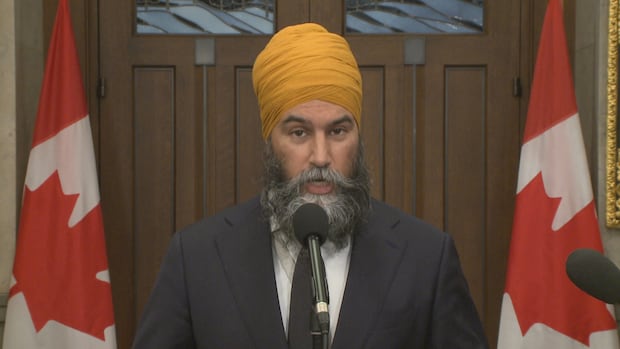The Liberal government and the NDP have agreed to introduce a two-month GST vacation on certain items before the holiday season, Radio-Canada has learned.
The measure, to be announced Thursday, is part of a multi-billion-dollar package designed to provide relief to families hit by rising prices. Ottawa also plans to send cheques to some Canadians in the spring.
Sources said the federal government will announce the temporary GST relief Thursday, which should take effect before Christmas. A long list of items are targeted, including certain grocery products on which the federal tax applies, such as beer, wine and prepared hot meals.
Ottawa will also temporarily suspend the GST on diapers, children’s clothing and shoes, children’s car seats and toys, among other items.
Radio-Canada and CBC News sources have also confirmed that the government intends to send individual cheques to Canadians in a certain income bracket in the spring.
These two measures, expected to cost several billion dollars, will be contained in a single bill that the NDP intends to support in the House of Commons, according to a source familiar with the discussions.
On Wednesday evening, NDP leader Jagmeet Singh said he would support the government’s GST proposal.
NDP to support affordability measures
“The NDP will vote for this measure because working people are desperate for relief, and we’re proud we delivered for them again,” he said in a statement.
Motions are expected to accompany the bill to ensure speedy passage and to put on hold, at least temporarily, the gridlock that has paralyzed the Commons for weeks.
The parties blame each other for tying Parliament up in a privilege debate that began in late September. That debate stems from a House order that directed the government to hand over unredacted documents related to a now-defunct foundation responsible for doling out hundreds of millions of federal dollars for green technology projects.
It is not yet known whether the relief measures will be part of the Liberal government’s fall economic statement or whether they will be adopted and voted on separately.
A lifeline for the Liberals?
This one-time agreement between the two parties does not necessarily mean that the NDP will support the Liberals’ fall economic statement. Sources said the New Democrats consider it a step in the right direction, but they have other demands.
If the economic statement contains new spending, it must automatically be subject to a confidence vote in the Commons, which has the potential to bring down the Liberal minority government. The Liberals must obtain the support of at least one other political party.
In September, the NDP pulled out of an agreement it made with the Liberals to keep the minority government in power by supporting it on key votes like budgets.
With Thursday’s announcement, Prime Minister Justin Trudeau is hoping to refocus his priorities on the cost of living and create movement in the polls, which still place his party some 20 points behind Pierre Poilievre’s Conservatives.
Trudeau has been hampered by troubles in Parliament. On Wednesday, Employment Minister Randy Boissonnault resigned from cabinet due to controversy surrounding his business dealings and shifting claims about his Indigenous family history.
The NDP’s promises
Last week, the NDP promised to go even further to improve Canadians’ purchasing power if elected. Singh said he would permanently eliminate the GST on essentials such as grocery store meals and snacks, internet and cell phone bills, diapers and children’s clothing, as well as home heating.
This measure would deprive the government of $5 billion in tax revenues each year, the NDP estimates, and would be offset by revenues from a tax on excessive corporate profits.
On Wednesday, Singh wrote to Canada’s premiers asking them to follow suit by removing their provincial sales taxes on essential items.
NDP Leader Jagmeet Singh says he has written to Canada’s premiers asking them to match his pledge to remove the GST from daily essentials by doing the same with their provincial sales taxes.
The NDP will support the temporary measure proposed by the Liberals, even if it is deemed insufficient.
But Singh said Wednesday night the party “will campaign hard on permanently scrapping the GST on daily essentials and monthly bills, like we already promised.”





